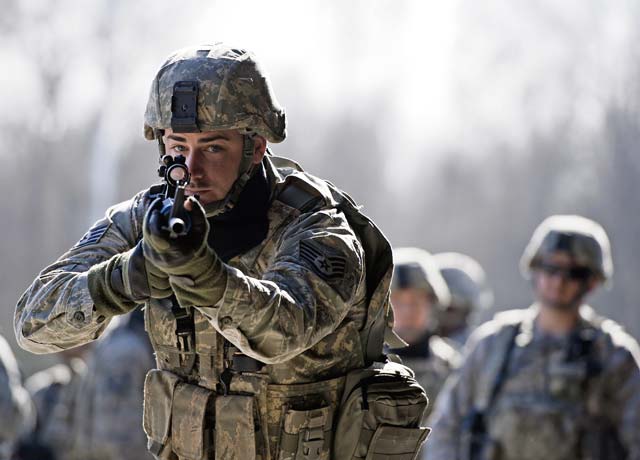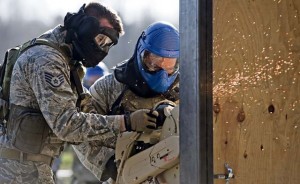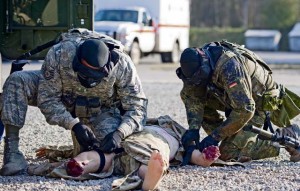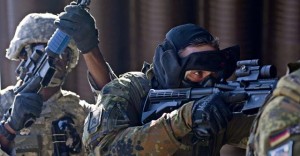
Staff Sgt. Richard Phillips, 703rd Munitions Support Squadron custody force member, assaults a complex during the Battlefield Leaders Assaulter Course, Integrated Combat Essentials, March 11 on Ramstein.
The 435th Contingency Response Group recently joined security forces from Turkey, Belgium, the Netherlands and Germany for a training course on tactical leadership.
Battlefield Leaders Assaulter Course, Integrated Combat Essentials — or BLAC ICE course — was conducted March 3 through March 13 on Ramstein and was designed to teach security forces members advanced tactics and shooting skills for use in the event of a base security breach.

Trainees learned skills such as advanced tactics and shooting. The training also focused on leadership. In the final days of the course, trainees completed simulated missions intended to exercise all skills and tactics taught during the program.
“The overarching goal is … to teach (Airmen) tactical leadership,” said Tech. Sgt. Jared Norwood, 435th Security Forces Squadron Ground Combat Readiness Training Center instructor. “They need to know how to make a decision on the fly when the situation is stressful.”
Security forces NCOs from bases across Europe attended the training.
Tech. Sgt. Jarvis Thompson, 703rd Munitions Support Squadron NCOIC of police services on Volkel Air Base in the Netherlands, was selected by his leaders to participate in the course. Thompson said the training encompassed all aspects of a security breach situation and introduced new and useful skills.

“As cops, we usually train until the hostilities are over and then we end the exercise. But here, you get a little bit extra,” he said. “They’ll put out mannequins that are squirting blood and you have to be quick on your feet and think, ‘What can I do to help save this guy’s life?’ It’s really great training.”
The presence of representatives from other nations enabled course instructors to share knowledge and experiences to improve future training.
Master Sgt. Christoph Czaja, German air force security squadron security forces member at Büchel Air Base, attended the course in order to learn techniques he can utilize when training German forces at his home unit.
“The instructors are very well trained, and they showed us a lot of new things,” Czaja said. “There are things that are good from our side and things that are good from this side. So if we put it all together, we’ll be great.”
Czaja said training with forces of other nations is key to becoming successful partners in protecting a base.
“I think the best skills come from training together,” Czaja said. “The American guys show us everything they do with the equipment they have, so we can hopefully take that and do the same training at our home bases.”

Together, trainees learned leadership skills that will improve U.S. security forces’ ability to work with host nation forces. Strong leadership is the most important skill the course teaches, Norwood said.
“Tactics are always changing and shooting just takes practice, but leadership needs to be knowledgeable and driven and taught over and over again,” Norwood said. “As long as you have good leadership, you can overcome any objective.”
This is the first time the BLAC ICE course has been held. The 435th CRG Cadre hopes to host the training program in the future with the participation of USAFE host nation militaries to build strong relations and leadership skills throughout NATO.







